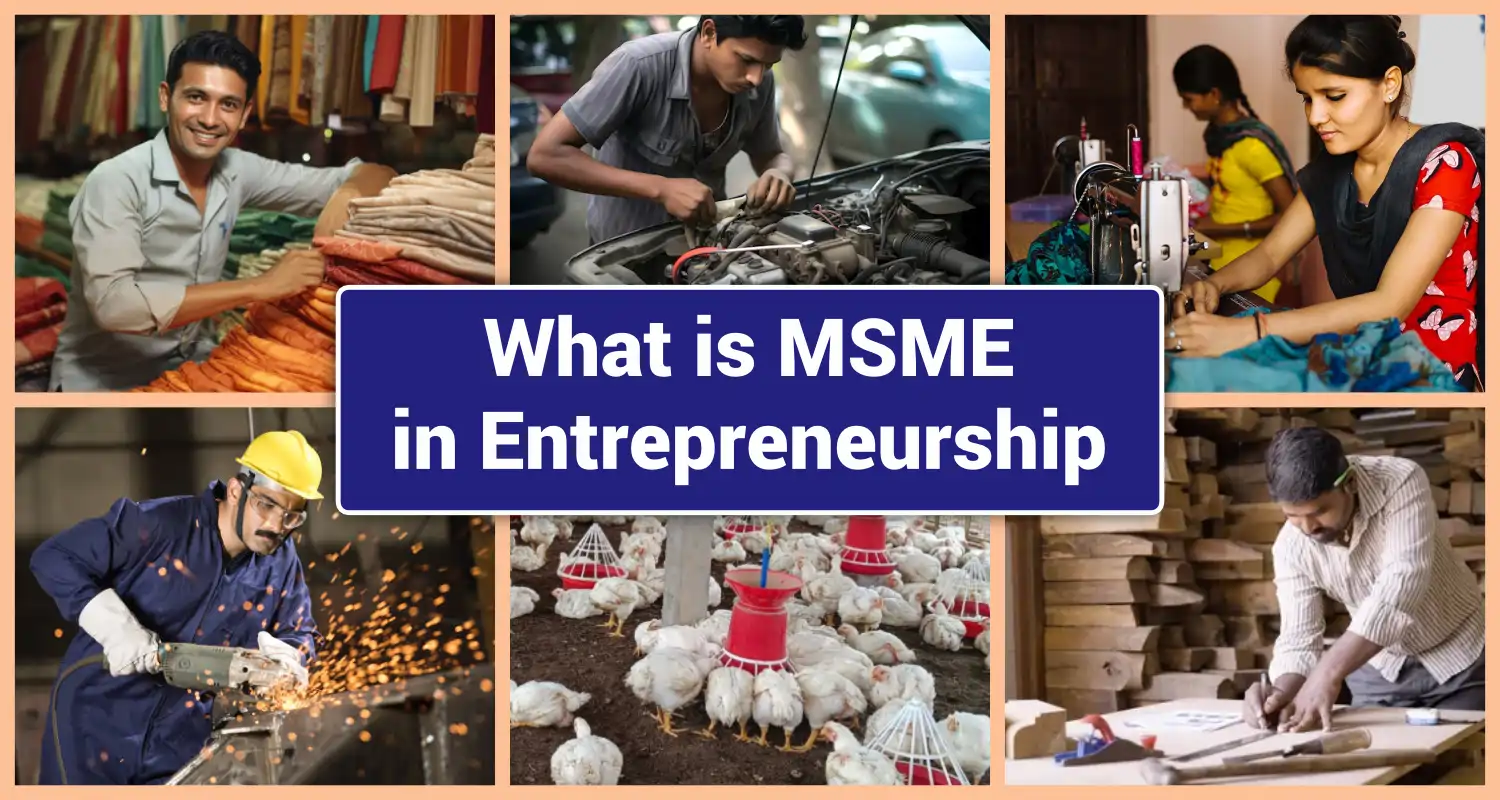What is MSME in Entrepreneurship

Imagine a buzzing marketplace with shops, stalls, and workshops each with a unique story to tell. Every entity has its tale of ambition, resilience, and innovation. All of this makes these small enterprises powerful in their rights. It is surprising how these Micro, Small, and Medium enterprises (MSMEs) drive growth, create jobs, and nurture their passion. In this blog let us explore the might of the uncelebrated champions of business that shape the economy significantly.
What is MSME entrepreneurship?
Micro, Small, and Medium Enterprises (MSMEs) are units that produce, manufacture, and process goods and commodities. The government of India first introduced the concept of MSME through the Micro, Small & Medium Enterprises Development (MSMED) Act, 2006.
What is the Classification of MSMEs in entrepreneurship?
MSMEs are classified according to their turnover and investment. The classifications as per the Aatma Nirbhar Bharat Abhiyan Scheme in 2020 are given in the table below:
| Size of the Enterprise | Investment and Annual Turnover |
| Micro | Investments less than Rs. 1 crore Turnover of less than Rs. 5 crores |
| Small | Investments less than Rs. 10 crores Turnover up to Rs. 50 crores |
| Medium | Investments less than Rs. 20 crores Turnover up to Rs. 100 crores |
What is the Role of Micro, Small and Medium Enterprises (MSME) in Entrepreneurship Development?
Some of the roles are described below:
- Provide Employment: This is an opportunity when additional employment can be generated. MSM Es are labour intensive so they involve maximum men and women and employ the agricultural sector in India. Usually, the farmers and landless labourers remain unemployed for a part of the year and it is good that the Micro, Small, and Medium Enterprises (MSME) can employ them for their work.
- Variety of Products: A whole gamut of products is offered by SMES for the use of masses like stationery, readymade garments, plastic and rubber goods, soaps, detergents, etc.
- Improves Economic Condition: MSMEs improve the economic condition of people around it as more and more people are employed. They usually are established in rural and semi-urban areas and mostly belong to the economically poor section of the society.
- Low Cost of Production: Simple products with the help of simple technology and local resources like labour and materials, lower the cost of production in MSME. This creates a sustainable model for the enterprise as well.
- Promotion of Artistic and Creative Sense: MSMEs are platforms where the artistic and creative sense of rural people come forth and are nurtured for betterment. MSMEs ensure that the natural products and the actual rural sense of using them is promoted widely.
- Rural Development: The establishment of MSMEs around economically weaker sections ensures improvement in many things like infrastructure, health facilities, safe drinking eaters, etc forging sustained growth and regional differences.
- Mobilisation of Local Resources: The establishment of more MSMEs can help in the maximum utilisation of local resources like entrepreneurship skills, small savings, or natural resources around rural areas.
What is small business entrepreneurship?
A business that functions on a small scale and involves less capital, less labour, and fewer machines to operate is known as small business entrepreneurship.
Small-scale industries produce goods and services on a small scale and they play an important role in the economic development of a country. For a small-scale industry, the owner’s investments are one time for less than a crore for machinery or plants or take a lease or hire purchase. Some small-scale industries include bakeries, candles, local chocolates, pens, paper etc.
Read More: Small Business Ideas
What are the Characteristics of Small-business entrepreneurship?
Some of the characteristics have been discussed below:
- Ownership: Owned by a single owner therefore also a sole proprietorship.
- Management: The owner controls the management
- Limited Reach: Their products or services have a limited reach as their area of operation is restricted. There might be a local shop or an industry located nearby in the area.
- Labour Intensive: As labour and manpower dependency is high in the small-scale industry, the focus on technology is much diminished.
- Flexibility: Owing to their smaller operations, they’re open and flexible to sudden changes
- Resources: The small-scale industries save on natural resources by optimum utilisation of available resources. Want to explore the essentials of corporate entrepreneurship? Click here for more insights.
Sapna aapka. Business Loan Humara.
Apply NowHow does the Study of management principles apply to a small-scale industry?
Here is a concise overview of how management principles can be tailored to the specific needs and challenges of a small-scale industry:
| Management Principle | Application in Small-Scale Industry | Key Considerations |
| Planning |
Strategic planning for business growth, resource allocation, and risk management. |
Focus on flexibility and adaptability to market changes. |
| Organizing |
Structuring resources, tasks, and responsibilities to achieve business goals. |
Streamlined processes to minimise costs and complexity. |
| Staffing |
Hiring, training, and retaining skilled labour to maintain productivity. |
Cost-effective recruitment and training programs. |
| Directing |
Leading and motivating employees to achieve organisational objectives. |
Personalised leadership to suit small team dynamics. |
| Controlling |
Monitoring performance and implementing corrective measures when necessary. |
Efficient tracking systems to ensure quality and efficiency. |
| Coordination |
Ensuring all departments and functions work in harmony toward common goals. |
Emphasis on clear communication and collaboration. |
| Decision-Making |
Making informed decisions to navigate challenges and opportunities. |
Quick and effective decision-making to respond to market dynamics. |
| Innovation |
Implementing new ideas and technologies to improve products and processes. |
Focus on incremental innovation to stay competitive. |
| Financial Management |
Managing finances, budgeting, and ensuring profitability. |
Efficient use of limited financial resources. |
| Marketing Management |
Developing marketing strategies to promote products and reach target customers. |
Cost-effective marketing tactics suitable for small businesses. |
| Customer Relationship Management |
Building and maintaining strong relationships with customers. |
Personalised customer service to enhance loyalty. |
| Risk Management |
Identifying and mitigating risks associated with operations and market fluctuations. |
Proactive risk assessment and contingency planning. |
| Supply Chain Management |
Managing suppliers and ensuring a smooth flow of materials and products. |
Close relationships with suppliers to ensure reliability. |
| Technology Management |
Utilizing technology to improve efficiency and productivity. |
Adoption of affordable and scalable technologies. |
Conclusion
MSMEs in entrepreneurship are a driver of growth and innovation in economic progress. They face several challenges like partial access to capital and market competition, but MSMEs thrive by leveraging their dexterity and customer relationships. Supporting and fostering MSMEs will bring about sustained economic development and a more inclusive business network.
FAQs
Q1. What are the important facts about MSME?Ans. As of 2024, the Micro, Small, and Medium Enterprises (MSMEs) sector in India has made significant contributions to the economy. MSMEs account for about 30% of India's GDP. They play an important role in employment, providing jobs to over 123.6 million people, which represents 62% of the overall employment in the country.
Q2. Who is eligible to register under MSME?Ans. An individual cannot apply for MSME registration. A proprietorship, partnership firm, company, trust, or society with an investment below Rs.50 crore and annual turnover below Rs.250 crore is eligible for MSME registration.
Q3. Is GST compulsory for MSME?Ans. The GST number is not mandatory for the MSME registration process. However, enterprises or businesses whose annual turnover is above ₹40 lakhs are taxable entities.
Q4. Who funds MSME?Ans. The Ministry of Micro, Small and Medium Enterprises and Small Industries Development Bank of India (SIDBI), established a Trust named Credit Guarantee Fund Trust for Micro and Small Enterprises (CGTMSE) to implement the Credit Guarantee Fund Scheme for Micro and Small Enterprises.
Sapna aapka. Business Loan Humara.
Apply NowDisclaimer: The information contained in this post is for general information purposes only. IIFL Finance Limited (including its associates and affiliates) ("the Company") assumes no liability or responsibility for any errors or omissions in the contents of this post and under no circumstances shall the Company be liable for any damage, loss, injury or disappointment etc. suffered by any reader. All information in this post is provided "as is", with no guarantee of completeness, accuracy, timeliness or of the results etc. obtained from the use of this information, and without warranty of any kind, express or implied, including, but not limited to warranties of performance, merchantability and fitness for a particular purpose. Given the changing nature of laws, rules and regulations, there may be delays, omissions or inaccuracies in the information contained in this post. The information on this post is provided with the understanding that the Company is not herein engaged in rendering legal, accounting, tax, or other professional advice and services. As such, it should not be used as a substitute for consultation with professional accounting, tax, legal or other competent advisers. This post may contain views and opinions which are those of the authors and do not necessarily reflect the official policy or position of any other agency or organization. This post may also contain links to external websites that are not provided or maintained by or in any way affiliated with the Company and the Company does not guarantee the accuracy, relevance, timeliness, or completeness of any information on these external websites. Any/ all (Gold/ Personal/ Business) loan product specifications and information that maybe stated in this post are subject to change from time to time, readers are advised to reach out to the Company for current specifications of the said (Gold/ Personal/ Business) loan.



